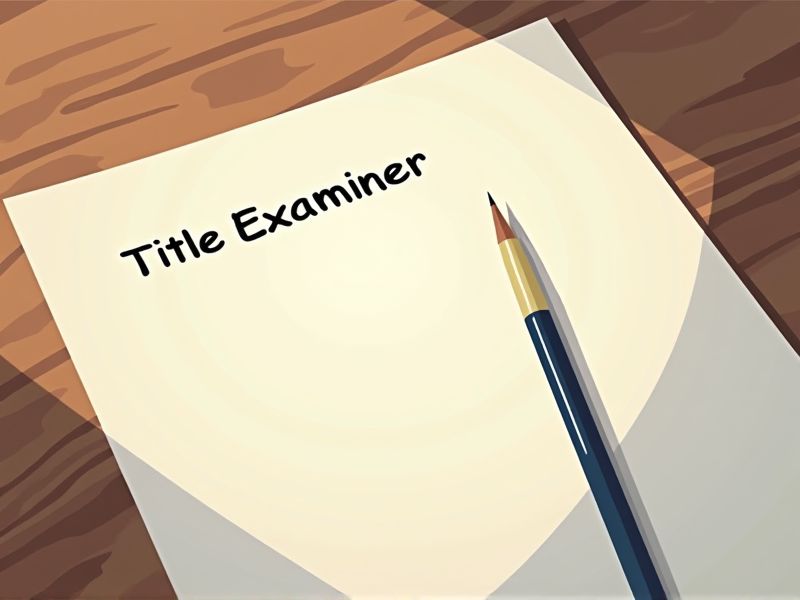
Title Examiners play a crucial role in real estate transactions by ensuring property titles are clear of any issues. Acquiring certifications demonstrates a commitment to industry standards and enhances credibility in a competitive field. Certifications also provide Title Examiners with specialized knowledge in title research, legal documentation, and property laws, thereby reducing potential errors and legal risks. Key certifications may be necessary to establish expertise as a Title Examiner.
Certified Title Examiner (CTE)
A Certified Title Examiner (CTE) enhances credibility by ensuring that the individual has met established standards in property title examination. This qualification aids in minimizing legal and financial risks by accurately identifying encumbrances or discrepancies in property titles. Comprehensive understanding of property laws and practices by a CTE leads to more efficient and accurate processing of title documents. The certification process often includes continued education, ensuring that examiners remain updated on legal changes in real estate.
Licensed Title Insurance Agent (LTIA)
A Licensed Title Insurance Agent (LTIA) is crucial for a Title Examiner because they ensure compliance with state regulations, which reduces the risk of legal complications. They have the expertise to accurately assess potential title defects, liens, or encumbrances, which can affect property transactions. Title Examiners rely on LTIAs to provide an additional layer of validation, which increases the trustworthiness of the title assessment process. The involvement of an LTIA can facilitate smoother communication with insurance underwriters, streamlining the issuance of title insurance policies.
Certified Real Estate Title Professional (CRETP)
Obtaining the Certified Real Estate Title Professional (CRETP) credential enhances a title examiner's credibility, reassuring clients and employers of their expertise and dedication to maintaining high industry standards. The CRETP certification signifies proficiency in identifying and resolving title issues, thereby reducing the risk of errors or disputes in real estate transactions. It also ensures that the title examiner is up to date with the latest legal requirements and best practices, which is crucial in an ever-evolving legal landscape. Employers are more likely to trust CRETP-certified examiners with complex cases, knowing they possess the advanced skills and knowledge necessary to navigate intricate title examinations effectively.
Accredited Land Title Expert (ALTE)
An Accredited Land Title Expert (ALTE) provides specialized knowledge needed to accurately assess complex property boundaries and legal land descriptions. Their expertise reduces the risk of errors, which could lead to costly legal disputes or transaction delays. Having an ALTE ensures compliance with local regulations and facilitates smoother real estate transactions. Their accreditation instills trust with clients, enhancing the credibility of title examinations.
Title Officer Certification (TOC)
Title Officer Certification (TOC) enhances a Title Examiner's credibility by validating their knowledge of title processes. By achieving this certification, examiners can demonstrate a comprehensive understanding of legal and regulatory changes affecting property titles. The TOC often leads to more trust from clients, as they are assured of thorough and accurate title examinations. With this certification, title examiners can also access more career opportunities and potentially higher earnings, as they have proven expertise.
Title Search Specialist Certification (TSSC)
Employers often prefer Title Examiners with a Title Search Specialist Certification (TSSC), since the certification represents a thorough understanding of title search processes and procedures. The TSSC ensures professionals stay updated with legal and regulatory changes impacting real estate transactions, directly affecting the accuracy and reliability of title searches. Possessing the certification often leads to increased trust and credibility among clients, influencing one's professional advancement. Certification often correlates with a reduction in errors during title examination tasks, improving overall efficiency.
Certified Escrow Officer (CEO)
A Certified Escrow Officer ensures the integrity and security of real estate transactions by managing funds and ensuring all legal requirements are met. Without a CEO, a title examiner's findings might be prone to errors in legal compliance, potentially leading to disputes or financial liabilities. They facilitate seamless communication between parties, ensuring that the title examiner's reports are executed accurately and promptly. Having a CEO involved streamlines the process, reducing the risk of fraud or mismanagement in transactions.
Real Property Law Certification (RPLC)
Real Property Law Certification (RPLC) enhances a Title Examiner's understanding of legal principles crucial for assessing property ownership accurately. This certification provides the necessary skills to identify potential title defects, reducing the risk of legal disputes. By demonstrating expertise through RPLC, Title Examiners gain credibility and trust from clients and employers. The certification updates professionals on current real estate laws, ensuring compliance and efficient property transactions.
Notary Public Certification (NPC)
A Notary Public Certification (NPC) is necessary for a Title Examiner to ensure legal document authentication during real estate transactions. This certification enables the Title Examiner to verify the identity of individuals involved, safeguarding against fraudulent activities. By obtaining an NPC, a Title Examiner gains authority to witness signings, which helps establish the validity of title documents. Compliance with legal standards through NPC enhances trust and credibility in professional dealings.
Continuing Education in Title Insurance & Underwriting Certification (CE-TIU)
Title examiners must stay updated on regulations and legal changes because these directly impact the accuracy of property title assessments. Continuing Education in Title Insurance & Underwriting Certification (CE-TIU) enhances their ability to identify and resolve title defects efficiently. Improved skills in underwriting reduce the risk of costly errors in title insurance policies. The certification ensures examiners adhere to industry standards, which fosters trust with clients and stakeholders.
Summary
With additional certifications, a reader entering the field as a Title Examiner can improve their employability and career advancement prospects. Employers might view certified professionals as more competent, leading to increased trust and responsibility. Enhanced skills and knowledge from certification programs can directly impact the efficiency and accuracy of title examination processes. The professional credibility of a certified Title Examiner can also result in access to higher-paying job opportunities and industry recognition.
